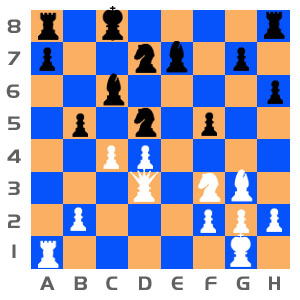

I can use a
65,536-processor computer to defeat Deep Blue in a
chess match.

 Deep Blue's major achievement was its speed and sophisticated
parrallel processing. This sounds very close to your own work. Do you
think Deep Blue breaks new grounds. Or it is not yet
anywhere near your own invention?
Deep Blue's major achievement was its speed and sophisticated
parrallel processing. This sounds very close to your own work. Do you
think Deep Blue breaks new grounds. Or it is not yet
anywhere near your own invention?
Yes, it is very close to my earlier work that demonstrated that massively parallel computers can be used to solve real problems. IBM applied the experience gained and lessons learned from my early work on massively parallel computing to design Deep Blue's chess program. In that sense, Deep Blue did not break any new scientific grounds.
In 1989, I used 65,536-processor massively parallel computer to to perform the world's fastest computation of 3.1 billion calculations per second. Back then, IBM believed that it will be impossible to use thousands of processors to solve scientific and for that reason refused to use massively parallel technology in computers such as Deep Blue.
Today, IBM develops and sells massively parallel computers such as Deep Blue which uses 256 processors. Garry Kasparov defeated 1989 IBM Chess computer which used one processor and lost to 1997 Deep Blue which used 256 processors. Since 256 times 256 is 65,536, Deep Blue will be 256 times faster and more powerful when IBM uses 65,536 processors in the future generation of Deep Blue. If I can find a sponsor, I can use a 65,536-processor computer to defeat Deep Blue in a chess match.

Deep Blue massively parallel supercomputer.
Deep Blue is based on massively parallel technology which enabled it to evaluate 200 million positions per second while Garry Kasparov was evaluating 3 positions per second. I am not surprised that Garry Kasparov was defeated since I proved in 1989 that this technology works for many applications. IBM has use the Deep Blue victory to provide another proof that the technology works.Using computers to play chess has something in common with using computers to discover and recover more oil. Both applications are computation-intensive because governing rules must be implemented for several locations or objects.

Deep Blue versus Garry Kasparov game six final position (5/11/97).
In chess playing, there are thousands of options and evaluating each option requires thousands of calculations.In petroleum reservoir simulation, there are thousands of oilfield locations and determining the amount of oil that can be recovered from each location requires thousands of calculations.

Click on emeagwali.com for more information.


